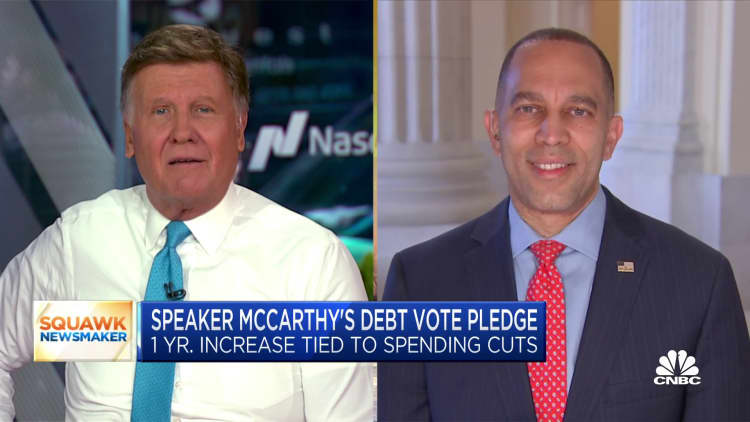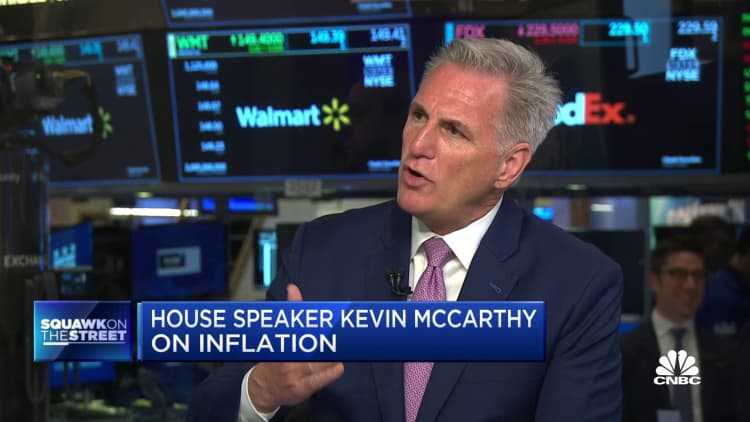
WASHINGTON — The top Democrat in the House slammed Republicans' plan to pass a bill later this month to suspend the debt ceiling for a year and impose broad federal spending cuts, rather than simply raise the $31.4 trillion limit and avoid any risk of potential U.S. debt default.
"Even the flirtation with the default is going to hurt everyday Americans," House Minority Leader Hakeem Jeffries told CNBC's "Squawk Box" on Tuesday.
"It risks raising car payments, it risks raising home mortgage payments, it risks raising student loan debt payments," he said. "It will hurt everyday Americans and crash our economy at a very fragile time, particularly in the immediate aftermath of the regional banking crisis."
The New York Democrat said refusing to raise the debt ceiling for the first time in history would have "catastrophic" consequences.
Jeffries said Democrats are open to negotiations on federal spending, but that "it should be done through a budget process and through the appropriations process, not in a hostage-taking situation."
"The right thing to do is for us to make sure that we protect the full faith and credit of the United States of America, particularly during a fragile time in our economy," said Jeffries.
Securities and Exchange Commission Chairman Gary Gensler echoed Jeffries' concerns Tuesday, telling lawmakers that the debt ceiling fight has already affected the markets.
"There's certain money market funds and other funds that are being careful about which short-term Treasury bills they buy," Gensler, who was appointed by President Joe Biden, told the House Financial Services Committee. "It is likely that we would start to see ... less liquidity in the Treasury markets, which ultimately means higher costs to the taxpayers coming into that."
Defaulting on the nation's debt would cause "one heck of a mess" in capital markets that would ripple into the banking system, he said.
On Monday, House Speaker Kevin McCarthy, R-Calif., said his new debt ceiling proposal will "save taxpayers trillions of dollars, make us less dependent upon China, curb our high inflation — all without touching Social Security and Medicare."
The McCarthy plan includes a cap on non-defense discretionary spending, a "clawback" of unspent pandemic relief funds and new work requirements for Medicare recipients of a certain age.
The House Speaker told CNBC on Monday that he could "get the party behind it," effectively admitting that his plan did not have the support of enough members of his caucus to pass in its current form.

A close McCarthy ally expressed confidence Tuesday that the party could pass McCarthy's bill, despite disagreements over key pieces of it.
"The deal in the House is you have to be able to count to 218 votes, and if you have 218 votes then you can [pass a bill]," Rep. Patrick McHenry, R-N.C., said on CNBC's "Squawk Box" Tuesday.
"I don't think it's going to be that much drama for us to pass this debt ceiling increase and spending cuts with it. Republicans are unified around this in the House," said McHenry.
But signs were already emerging Tuesday that Republicans might not have the 218 votes they need, regardless of what they put in the bill to try and win over conservatives.
Biden has demanded that Republicans present their own spending budget as a starting point in negotiations, something McCarthy has yet to do.
A GOP budget would likely contain spending cuts that are unpopular with voters, and Jeffries took aim at some of these on Tuesday.
"We certainly shouldn't entertain cuts to social security and Medicare and Medicaid and veterans benefits and things of this nature that some of the extreme MAGA Republicans in the House majority would like to do," he said.



